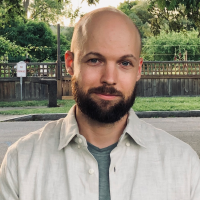Mikko Harvey

When I’m too closed off from my inner life—when I’ve drifted into a mindset of fixating on my to-do lists, my frustrations, my stresses—I have almost no chance of writing a good poem.
Jump to navigation Skip to content
In this online exclusive we ask authors to share books, art, music, writing prompts, films—anything and everything—that has inspired them in their writing. We see this as a place for writers to turn to for ideas that will help feed their creative process.

When I’m too closed off from my inner life—when I’ve drifted into a mindset of fixating on my to-do lists, my frustrations, my stresses—I have almost no chance of writing a good poem.

My debut novel, Calling for a Blanket Dance, is fourteen years in the making. Fourteen years! I wrote the two earliest chapters back in 2008 and 2009, when I was an undergrad at the Institute of American Indian Arts in Santa Fe.

I keep a copy of Gabriel García Márquez’s One Hundred Years of Solitude near my desk at all times, not just because it’s my favorite novel, but because it’s a book so jam-packed with characters and events and magic and violence that whenever I find myself stuck writing a particular scene o

Look at trees—look at rocks—look at birds and grass and leaves. Step out briefly from the human world into the world where “I” exists, like a figure in a Chinese landscape painting, as a small point in the periphery.

When I become stuck in my writing (which is to say, almost every time I try to get something onto the page), I often consider where else I experience stuck-ness and what sensations emerge in my body. Today, I am thinking about rock climbing.

All writers must engage in two major activities—composing and revising—and I’ve never met a writer who didn’t greatly favor one over the other. I love revising, which I can engage in anytime, anywhere.

Yukio Mishima was one of the most complicated and fraught figures in twentieth-century literature, and his sophomore novel, Confessions of a Mask, published in 1949, remains a classic.

I believe I became a writer when, at the age of fifteen, after staying up all night reading Arundhati Roy’s The God of Small Things, I glanced at the acknowledgements page and saw that she’d thanked somebody who had the same unusual name as mine.

To escape the net, I need to dance it out—to return to my body and its elated improvisation. With my first book, As She Appears, it was a careful writing and, at times, a difficult one.

I rarely get stuck in my writing and that’s not a flex. I just make sure to have a bunch of options at my disposal. For one thing, I work on multiple manuscripts at the same time so I’ll always have several books I can jump into, which helps demystify the singular artifact.